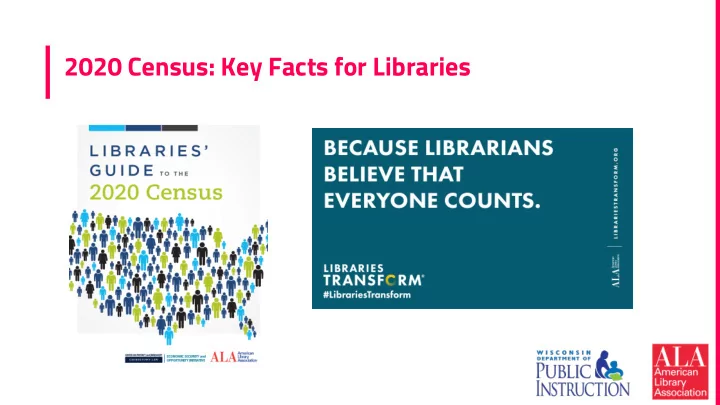

2020 Census: Key Facts for Libraries
Many thanks to the Public Library Association for these slides ▪ Cindy Fesemyer ▪ Adult and Community Services Consultant
What’s ahead? ▪ What is the census, and why is it important? ▪ Who is at risk for not being counted? ▪ How will the 2020 Census work? ▪ What can libraries do? ▪ QA/discussion
What is the decennial census? ▪ It’s in the constitution. ▪ Count every person in the U.S. once, and only once, and in the right place. ▪ Essential for: ▫ Federal funding ▫ Determining what’s “rural” ▫ Political representation ▫ Informed decision-making
Does the census affect funds for my community? YES! Help your community get its fair share for schools, health centers, roads, housing assistance and other vital programs. ▪ IMLS state grants ▪ National School Lunch Program ▪ Medicare ▪ SNAP
Who is at risk of being undercounted?
How will the 2020 Census Work? ▪ March 12 – mailing to every household ▫ New option to respond online ▫ Other methods for group living situations ▫ Household visits in remote and rural areas ▪ April 1 – “Census Day”
How will the 2020 Census Work? April – Group quarters counted May – In-person visits to households that haven’t responded ▪ Paper questionnaire sent to households that haven’t responded ▪ In-person follow-up, if needed
How will the Census work? ▪ Online, by phone, or by mail ▫ Online – smartphone, tablet, or computer ▫ Online – secure and responses encrypted ▫ Online & phone – questionnaire available in 13 languages ▪ About 10 minutes to complete questionnaire ▪ Toll-free Census Bureau phone hotline in 13 languages
How can people respond to the 2020 Census? ▪ Efforts to reach hard-to-count communities ▫ Online and phone questionnaire available in 13 languages ▫ Guides in 59 non-English languages ▫ Census Bureau plans to hire employees who are ▸ familiar with neighborhoods ▸ reflect diversity of communities ▫ Census Bureau will partner with “trusted voices” – such as libraries
What is new in the 2020 Census? ▪ Online self-response ▪ Household relationship question ▪ No citizenship question Census responses are confidential.
What can libraries do? How can libraries prepare? Participate in Complete Count Committees ▪ Local communities establish ▫ To increase awareness ▫ To encourage residents to respond to 2020 Census https://www.census.gov/library/visualizations/interactive/2020-complete-count-committees.html
What can libraries do? How can libraries prepare? Wisconsin Complete Count Committees
What can libraries do? How can libraries prepare? Prepare for increased use of computers and the Internet ▪ Census Bureau job hiring requires online application ▪ 2020 census will encourage online response ▪ March and April 2020 – Many people may come to libraries to complete census form.
What can libraries do? How can libraries prepare? Help community members apply for census jobs ▪ Census Bureau will hire about 500,000 temporary workers ▫ Jobseekers must apply online ▫ Apply online at 2020census.gov/jobs
What can libraries do? How can libraries prepare? Help community members apply for census jobs ▪ Spread the word – newsletters, social media ▪ Host job fairs with Census Bureau For a local contact: 1-855-JOB-2020 and press 3 to reach your area census office
What can libraries do? How can libraries prepare? Share information about the 2020 Census. The more people know about the census, how the data are used, and how it impacts them and their communities, the more likely they are to participate.
What can libraries do? How can libraries prepare? Share information about the 2020 Census. ▪ Host programs and events to increase awareness of the upcoming census ▪ Highlight the census in newsletters, social media, and on website
What can libraries do? How can libraries prepare? Fight misinformation, disinformation, and scams. ▪ People may have questions and concerns ▪ Libraries can provide accurate information [image
What can libraries do? How can libraries prepare? censushardtocountmaps2020.us Reach out to hard-to-count populations.
Are there special challenges for rural residents? The more rural a county — the higher likelihood of undercount. ▪ Remote Alaska ▪ Households with PO boxes ▪ Households on rural routes ▪ Low household internet rates ▪ High-poverty areas ▪ Migrant/seasonal farmworkers
Say YES to Wisconsin Counts
Say YES to Wisconsin Counts
Say YES to Wisconsin Counts
Learn More ▪ ALA ala.org/census ▪ Census Bureau 2020census.gov ▪ Say YES to WI Counts https://dpi.wi.gov/sites/default/files/imce/pld/pdf/library_census_2020_handout_ WEB_002.pdf ▪ Complete Count Community info https://www.census.gov/programs-surveys/decennial-census/2020- census/complete_count.html
Get in touch ▪ Cindy Fesemyer ▪ Adult and Community Services Consultant ▪ Cindy.Fesemyer@dpi.wi.gov ▪ 608-266-8053
Recommend
More recommend